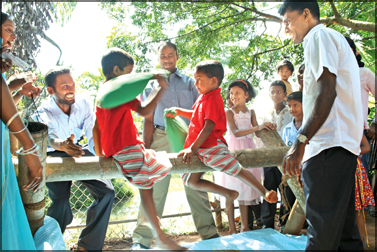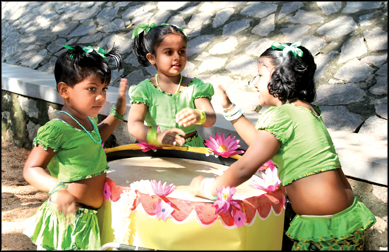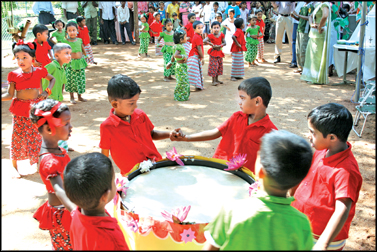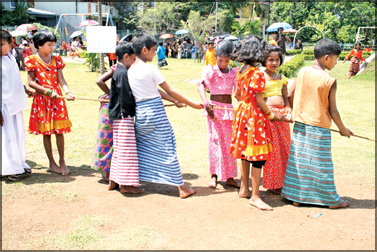For firm, lasting happiness...
Samangie WETTIMUNY
 Thousands of articles have been written on New Year, but there’s
always something left unsaid. “Avurudu” is the most powerful of `all’, I
was told by my parents at a time I was not big enough to understand why
everyone awaits the arrival of Sinhala and Hindu New Year with much
pleasure and anxiety, and why so much of importance is attached to this
event. “All would light the hearth and have meals at the same time or at
an astrologically determined auspicious time. Even an `Order of the
King’ would not be followed by everyone alike, with same interest!” My
father explained to me. Since then I did not have any queries over its
importance! Traditions and rituals that are passed on from our grand
parents and parents are practised by us, setting an example for the
generations to come. Thousands of articles have been written on New Year, but there’s
always something left unsaid. “Avurudu” is the most powerful of `all’, I
was told by my parents at a time I was not big enough to understand why
everyone awaits the arrival of Sinhala and Hindu New Year with much
pleasure and anxiety, and why so much of importance is attached to this
event. “All would light the hearth and have meals at the same time or at
an astrologically determined auspicious time. Even an `Order of the
King’ would not be followed by everyone alike, with same interest!” My
father explained to me. Since then I did not have any queries over its
importance! Traditions and rituals that are passed on from our grand
parents and parents are practised by us, setting an example for the
generations to come.
By now we have already discussed among our family members as to how
our plans for this New Year might best be carried out. In two days time,
even before the early morning rays of Sun filter through the trees of
your compound, you will light the hearth to prepare Kiribath (milk rice)
marking the beginning of yet another New Year. At 5.50 a.m, on April 14,
you all may enjoy a plate of well-prepared Kiribath along with other New
Year sweetmeats.
No matter whether you are a teenager, youth, a middle-aged or an
elder, it is with same interest that all of us engage in New Year
celebrations.. Those are the rituals and cultural practices, which the
Sinhalese and Tamils never tire of! More than all, we all feel
victorious as terrorism is cringing in fear as our armed Forces could
face up to it, putting back a smile on every face, enabling the
Sinhalese and Tamils to renew their age-old friendships.
 The sun gives life to all. Centred around the sun, the traditional
New Year celebrations originated as a harvest thanksgiving when farmers
celebrated their harvest during an astrologically auspicious solar
phase. Even today among the farmer community, the New Year Kiribath is
prepared by the harvest reaped in the Maha season. The sun gives life to all. Centred around the sun, the traditional
New Year celebrations originated as a harvest thanksgiving when farmers
celebrated their harvest during an astrologically auspicious solar
phase. Even today among the farmer community, the New Year Kiribath is
prepared by the harvest reaped in the Maha season.
Though most of us are in the habit of exchanging New Year cards on
January First, the first day of the year according to the Gregorian
Calendar (which is followed by most European countries), to us the New
Year arises when the Sun moves from Meena Rashi (House of Pisces) to the
Mesha Rashiya (House of Aries). Apart from New Year customs and rituals
such as seeing the new moon, lighting the hearth, having meals at the
auspicious time, engaging in transactions, boiling-over of milk on the
hearth, oil anointing etc, there are several games which people engage
in after the dawn of the New Year.Thanks to the extended family system
we still have elders with us, who look back nostalgically to the good
old days when they could enjoy the true sense of New Year, without
becoming mere viewers of `New Year Festivals’ hosted by various FM
channels! Anyway such festivals should not be viewed with scorn always
as they at least play a role in retaining those dying traditions. Your
parents or grand-parents would tell you how they ran through groves that
stretched for miles in their villages losing themselves in the scent of
fruit ripening in the sun!
Also how `Koha’ birds (Cuckoo birds) used to sing their usual songs
several days or even several weeks prior to the dawn of New Year. Today
a notable absence, is Koha’s song.
 Social relationships will take on a new pace as usual. It is New Year
which helps us stay in close touch with our relatives and friends over
the years, shedding animosities and strengthening relationships. Social relationships will take on a new pace as usual. It is New Year
which helps us stay in close touch with our relatives and friends over
the years, shedding animosities and strengthening relationships.
I may not like the company of certain people, I may not even want
some of our `relatives’ to visit us, but I have to be cordial with
everyone on the New Year day! This is the ideal period to reconcile and
it is indeed great that we have festivals of this nature. So unless if
you suffer from `Social phobia’ and badly needs a `hide-out’, everyone
will look forward to this great cultural event!
In fact it is our long lasting traditions and cultural festivals such
as Sinhala and Hindu New Year that have bound relatives and friends
together over the centuries. Anyway when the elderly population is
considered, future generations may suffer more from social isolation
than elderly people do today. As long as we celebrate festivals of this
nature which strengthen friendships, which teach us the value of
respecting our parents and elders, we need not fear social isolation.
Beauty lies in the extended family, not in the nuclear one which traps
its members in a `cage’!
 This is the time for jubilation. The true spirit gained through this
New Year will be a motivation to carry out duties, (whether at home,
work place or school) with commitment and accountability. This is the time for jubilation. The true spirit gained through this
New Year will be a motivation to carry out duties, (whether at home,
work place or school) with commitment and accountability.
This is the time to unravel webs of tangled emotions, to clear clouds
of miseries that had tormented you over the years and try to build a
firm and lasting happiness.
Along with the decision of the government to plant two million
saplings across the country as the New Year dawns, let us hope that
those plants would grow to a tremendous size and future generations
would be able to celebrate New Year under that shelter, enjoying the
`one time familiar’ mellifluous voices of the `Koha’ birds wishing them
`Suba Aluth Avuruddak’! |

